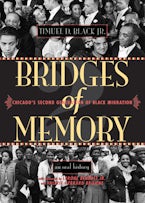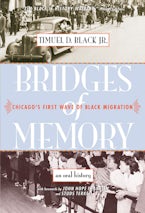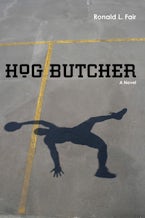Chicago Lives
Showing results 1-10 of 15
Filter Results OPEN +

Knocking Down Barriers
This book is the memoir of Truman K. Gibson Jr., a civil rights advocate and attorney who campaigned to integrate the military and end restrictive housing covenants, and a sports executive in the world of boxing.
Sidewalks
"A wonderful book that tells you the basic truths of our city." —Studs Terkel Few people know Chicago as do Rick Kogan and Charles Osgood, and their "Sidewalks" column for the...
Bridges of Memory Volume 2
In the second volume of Bridges of Memory, historian Timuel D. Black Jr. continues his conversations with African-Americans who migrated to Chicago from the South in search of economic, social, and cultural opportunities. With his trademark gift for interviewing, Black—himself the son of first-generation migrants to Chicago--guides these individual discussions with ease, resulting in first-person narratives that are informative and entertaining.
Bridges of Memory
Recipient of 2007 The Hyde Park Historical Society Paul Cornell Award
Oral history in the first order, Bridges of Memory brings to life a wide cross-section of African Americans voices vividly recollecting a neighborhood, a city, a society, and a people undergoing dramatic and unprecedented change. Timuel D. Black Jr., one of Chicago's leading African American historians, presents the first of three volumes of oral history, this one focusing on Chicago's first wave of black migration from the South.
The First Lady of Olympic Track
The 1928 Olympic Games in Amsterdam were the first in which women—over the objections of many, including Pope Pius XI and the founder of the modern Olympics, Baron Pierre de Coubertin—were allowed to run in the marquee track events.
Hog Butcher
Instantly recognized as a gritty classic when it was first published in 1966, Hog Butcher was later adapted for the 1975 film Cornbread, Earl and Me. This new edition brings back into print Fair’s startlingly relevant indictment of Chicago’s inequalities.
Earl B. Dickerson
Recipient of 2007 The Hyde Park Historical Society Paul Cornell Award At fifteen, Earl Burrus Dickerson stowed away on a train in Canton, Mississippi, fleeing the racial oppression of...
Dawn Clark Netsch
Illinois Democratic politics has recently produced the most skilled and inspirational politician in memory . . . and has also reminded us of the need for further reform. It is fitting, then, that the latest installment of the Chicago Lives series turns to Dawn Clark Netsch, a leading reformer of Illinois politics since the 1950s and the first woman major party nominee for governor of Illinois.
Challenging the Daley Machine
Recipient of 2007 The Hyde Park Historical Society Paul Cornell Award
Winner of 2006 Illinois State Historical Society Book Award
Challenging the Daley Machine is more than a memoir. It's a historical portrait of the way things were done under the Boss, when changing times and a changing city forced the Machine to confront the problems Despres championed.
Long Way Home
By all accounts, Jovan Mosley was a good kid. He was working on a way out of his tough Chicago neighborhood and had been accepted at Ohio State University when he was forced to confess to a murder he did not commit. He then spent five years and ten months in jail without a trial. His efforts to exonerate himself got him nowhere until he happened to meet a successful criminal defense lawyer, Catharine O’Daniel.

Knocking Down Barriers
Sidewalks
Bridges of Memory Volume 2
Bridges of Memory
Oral history in the first order, Bridges of Memory brings to life a wide cross-section of African Americans voices vividly recollecting a neighborhood, a city, a society, and a people undergoing dramatic and unprecedented change. Timuel D. Black Jr., one of Chicago's leading African American historians, presents the first of three volumes of oral history, this one focusing on Chicago's first wave of black migration from the South.
The First Lady of Olympic Track
The 1928 Olympic Games in Amsterdam were the first in which women—over the objections of many, including Pope Pius XI and the founder of the modern Olympics, Baron Pierre de Coubertin—were allowed to run in the marquee track events.
Hog Butcher
Instantly recognized as a gritty classic when it was first published in 1966, Hog Butcher was later adapted for the 1975 film Cornbread, Earl and Me. This new edition brings back into print Fair’s startlingly relevant indictment of Chicago’s inequalities.
Earl B. Dickerson
Dawn Clark Netsch
Challenging the Daley Machine
Winner of 2006 Illinois State Historical Society Book Award
Challenging the Daley Machine is more than a memoir. It's a historical portrait of the way things were done under the Boss, when changing times and a changing city forced the Machine to confront the problems Despres championed.
Long Way Home
By all accounts, Jovan Mosley was a good kid. He was working on a way out of his tough Chicago neighborhood and had been accepted at Ohio State University when he was forced to confess to a murder he did not commit. He then spent five years and ten months in jail without a trial. His efforts to exonerate himself got him nowhere until he happened to meet a successful criminal defense lawyer, Catharine O’Daniel.










